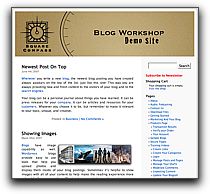 People often ask me "What is a blog?". The most common follow-up questions is "How is a blog different from a website?"
People often ask me "What is a blog?". The most common follow-up questions is "How is a blog different from a website?"
My short answer is that a blog is very similar, if not the same, as a website. Although there are a few differences.
For reference, I have set up a demonstration blog at http://demoblog.squarecompass.com/
Blogs come in many shapes and sizes, and can fulfill a number of purposes. We'll get in to this later. For now, let's focus on answering the question; "What is a blog?"
In terms of content, a blog is the electronic equivalent of a journal or diary. Blog software is designed to make it easy for you to add content on a regular schedule, and to present it in a chronological series. Each entry you make is called a 'post', and each post can be of any length and can include images, audio files, and even video.
If you haven't had a chance to take a look at the demo blog, take a moment to look around.You'll see that there are several articles posted on the main page, each including images and links.
You will also notice a navigation structure along the right hand side of the page. You can also see this same navigation to the right of this post. The blog software takes care of creating this navigation for you, allowing you to focus on content development without the worry of managing a website.
As you browse the navigation, you will notice that there are links to pages that are not included in the 'journal' format. Most blogs allow you to distinguish between a 'blog post' (a 'journal entry'), and a 'static page'. A static page is a standalone page of content that you want to be available to your readers all the time, and that isn't dependent on the chronological format.
Blog postings are your regular updates, and static pages are your information pages. Common uses for these static pages are a 'Contact Me' page, an About Me' page, or other reference material that needs to be accessible all the time.
Blogs often include a 'blogroll' too. A blogroll is simply a list of URLs that the blogger chooses to include as additional resources or for reference. The blogroll can be an important SEO tool as you learn to create external links to other sites that are relevant to your blog subject.
Blogs are great SEO tools because they appeal to search engines for several reasons. In particular, a blog allows you to post content as frequently as you can. Search engines are constantly looking for new content to index, and blogs make it easy for you to provide indexable content. The more frequently you post content, the more often the search engines will visit your site to look for new content.
ListPipe blogs receive weekly content from our professional writers in order to train the search engines to visit frequently. The more frequent the visitations, the sooner new content is indexed and searchable.
Blogs are extremely flexible, and allow us regular folks the ease and freedom to create content on the Internet. Take a look at the sample blog to learn more about what a blog is, how a blog works, and what can be done with a blog.
I'll be posting regular content here in our SEO Tips Blog to help you better understand blogging, and how it can help you reach a wider audience and bring traffic to your 'normal' website.
